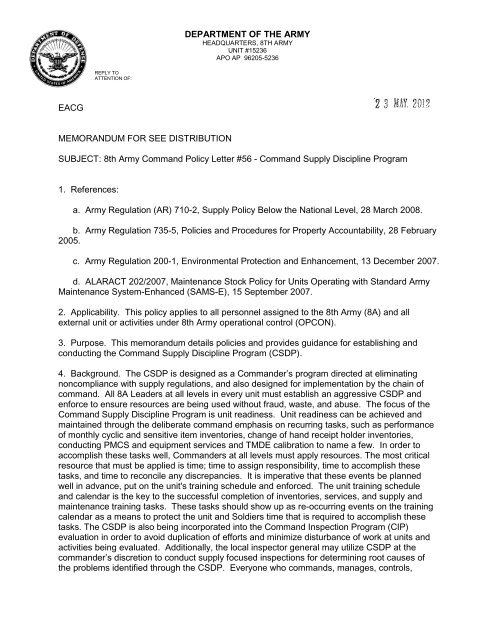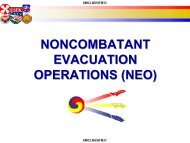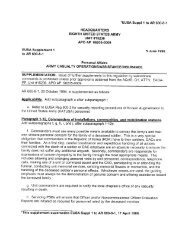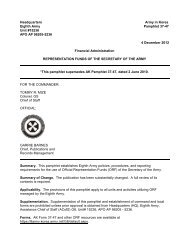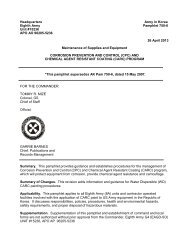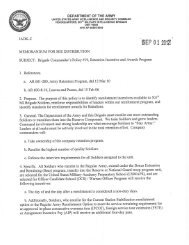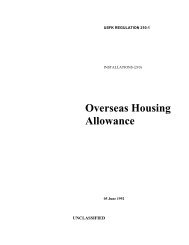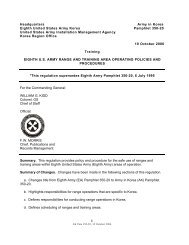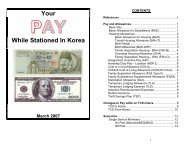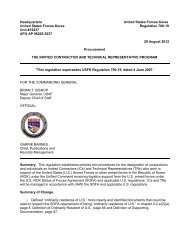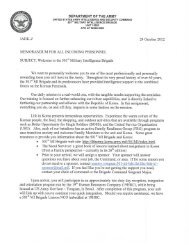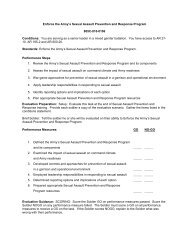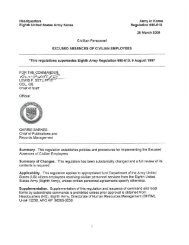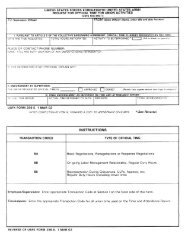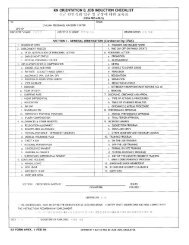Command Supply Discipline Program - U.S. Army
Command Supply Discipline Program - U.S. Army
Command Supply Discipline Program - U.S. Army
You also want an ePaper? Increase the reach of your titles
YUMPU automatically turns print PDFs into web optimized ePapers that Google loves.
EACG<br />
REPLY TO<br />
ATTENTION OF:<br />
MEMORANDUM FOR SEE DISTRIBUTION<br />
DEPARTMENT OF THE ARMY<br />
HEADQUARTERS, 8TH ARMY<br />
UNIT #15236<br />
APO AP 96205-5236<br />
SUBJECT: 8th <strong>Army</strong> <strong>Command</strong> Policy Letter #56 - <strong>Command</strong> <strong>Supply</strong> <strong>Discipline</strong> <strong>Program</strong><br />
1. References:<br />
a. <strong>Army</strong> Regulation (AR) 710-2, <strong>Supply</strong> Policy Below the National Level, 28 March 2008.<br />
b. <strong>Army</strong> Regulation 735-5, Policies and Procedures for Property Accountability, 28 February<br />
2005.<br />
c. <strong>Army</strong> Regulation 200-1, Environmental Protection and Enhancement, 13 December 2007.<br />
d. ALARACT 202/2007, Maintenance Stock Policy for Units Operating with Standard <strong>Army</strong><br />
Maintenance System-Enhanced (SAMS-E), 15 September 2007.<br />
2. Applicability. This policy applies to all personnel assigned to the 8th <strong>Army</strong> (8A) and all<br />
external unit or activities under 8th <strong>Army</strong> operational control (OPCON).<br />
3. Purpose. This memorandum details policies and provides guidance for establishing and<br />
conducting the <strong>Command</strong> <strong>Supply</strong> <strong>Discipline</strong> <strong>Program</strong> (CSDP).<br />
4. Background. The CSDP is designed as a <strong>Command</strong>er’s program directed at eliminating<br />
noncompliance with supply regulations, and also designed for implementation by the chain of<br />
command. All 8A Leaders at all levels in every unit must establish an aggressive CSDP and<br />
enforce to ensure resources are being used without fraud, waste, and abuse. The focus of the<br />
<strong>Command</strong> <strong>Supply</strong> <strong>Discipline</strong> <strong>Program</strong> is unit readiness. Unit readiness can be achieved and<br />
maintained through the deliberate command emphasis on recurring tasks, such as performance<br />
of monthly cyclic and sensitive item inventories, change of hand receipt holder inventories,<br />
conducting PMCS and equipment services and TMDE calibration to name a few. In order to<br />
accomplish these tasks well, <strong>Command</strong>ers at all levels must apply resources. The most critical<br />
resource that must be applied is time; time to assign responsibility, time to accomplish these<br />
tasks, and time to reconcile any discrepancies. It is imperative that these events be planned<br />
well in advance, put on the unit's training schedule and enforced. The unit training schedule<br />
and calendar is the key to the successful completion of inventories, services, and supply and<br />
maintenance training tasks. These tasks should show up as re-occurring events on the training<br />
calendar as a means to protect the unit and Soldiers time that is required to accomplish these<br />
tasks. The CSDP is also being incorporated into the <strong>Command</strong> Inspection <strong>Program</strong> (CIP)<br />
evaluation in order to avoid duplication of efforts and minimize disturbance of work at units and<br />
activities being evaluated. Additionally, the local inspector general may utilize CSDP at the<br />
commander’s discretion to conduct supply focused inspections for determining root causes of<br />
the problems identified through the CSDP. Everyone who commands, manages, controls,
EACG<br />
SUBJECT: 8th <strong>Army</strong> <strong>Command</strong> Policy Letter #56 – <strong>Command</strong> <strong>Supply</strong> <strong>Discipline</strong> <strong>Program</strong><br />
issues, and utilizes government property has an inherent responsibility to ensure that the <strong>Army</strong><br />
regulatory guidance on supply control is strictly followed.<br />
5. Discussion.<br />
a. Responsibilities:<br />
(1) 8A G4<br />
(a) Appoint a senior logistician as the CSDP program coordinator for 8A HQ.<br />
(b) Provide the necessary tools for commanders to successfully address the<br />
relationship of good logistical processes and operations achievements which are reached by<br />
stressing good supply discipline. The 8A <strong>Command</strong> Inspection <strong>Program</strong> (CIP) validates the<br />
effectiveness of the unit’s CSDP<br />
status.<br />
(c) Oversee the CSDP and keeping the 8A commander informed of overall unit<br />
(d) Ensure CSDP is incorporated into the CIP, and ensuring CSDP evaluations are<br />
conducted in accordance with (IAW) AR 710-2, Appendix B.<br />
CSDP.<br />
8 th <strong>Army</strong>.<br />
(e) Ensure all assigned, attached units, and activities adhere to the principles of the<br />
(f) Modify the program as deemed necessary in light of the mission and tasks of the<br />
(g) Publish and provide CSDP inspections checklists to subordinate commands.<br />
(h) Use the results of the CSDP evaluations to determine candidates for the Chief of<br />
Staff, <strong>Army</strong>, <strong>Supply</strong> Excellence Award (CSA SEA) program.<br />
(i) Ensure procedures for government purchase card (GPC) purchases are<br />
incorporated into the 8th <strong>Army</strong> CSDP.<br />
(2) <strong>Command</strong>ers, directors, supervisors, and special staffs are charged with enforcing<br />
compliance with the CSDP. The responsibilities include, but are not limited to:<br />
(a) Appoint, in writing, a senior logistician in the headquarters as the CSDP monitor<br />
who implements the commander’s assessed supply and maintenance areas of concern. The<br />
CSDP is mandatory and it is meant to reinforce command, supervisory, and managerial<br />
responsibilities. Units will continue to ensure that CSDP processes and procedures are<br />
conducted IAW regulatory guidance and that leadership (first line and higher) are verifying that<br />
disciplined tasks are performed to standard.<br />
(b) Enforce compliance with supply policy by subordinate personnel.<br />
2
EACG<br />
SUBJECT: 8th <strong>Army</strong> <strong>Command</strong> Policy Letter #56 – <strong>Command</strong> <strong>Supply</strong> <strong>Discipline</strong> <strong>Program</strong><br />
(c) Ensure that all government property, regardless of source, is accounted for, to<br />
include GPC purchased property.<br />
(d) Recognize both superior and inferior performance regarding supply discipline.<br />
(e) Report any equipment loss, damage, or destruction of government property IAW<br />
AR 735-5 and initiating administrative actions to assess liability or to provide relief from<br />
responsibility.<br />
(f) Ensure all staff agencies are aware of and perform their duties in accordance with<br />
the CSDP.<br />
(g) Ensure that all property transactions, to include requisitions, transfers, and<br />
disposals (to include scrap), are coordinated with the property book officer (PBO).<br />
(h) Ensure that all found on installation (FOI) government property is reported to the<br />
PBO in order to establish property accountability.<br />
(i) Ensure that all non-expendable item purchases made with the GPC is<br />
coordinated with the PBO before purchases are approved by the Billing Official, and, after<br />
purchase, to ensure items are accounted for in the Property Book Unit <strong>Supply</strong> Enhanced system<br />
(PBUSE) as needed.<br />
(j) Focus not just on correcting deficiencies in supply discipline but establish a<br />
training program to ensure leaders and soldiers initiate not just corrective actions but learn and<br />
sustain sound supply discipline principles.<br />
(k) Conduct the following tasks on a recurring basis. The list, while not all inclusive,<br />
provides the 8th <strong>Army</strong> baseline requirements expected to be conducted in a disciplined fashion<br />
across all units.<br />
Cyclic and Sensitive Item Inventories<br />
Weekly PMCS<br />
Vehicle and equipment services<br />
TMDE management<br />
OCIE and Individual equipment serviceability checks<br />
Reconciliation of document register<br />
Validate and sign commander exception report<br />
Verify and sign hand receipt monthly with PBO<br />
Establish and maintain accountability of newly fielded items<br />
Ensure obsolete/excess equipment and disposition instruction are followed<br />
Conduct FLIPLs to standard when property loss is discovered<br />
Ensure critical sustainment events are annotated on the training calendar<br />
(3) Property Book Officer (PBO).<br />
3
EACG<br />
SUBJECT: 8th <strong>Army</strong> <strong>Command</strong> Policy Letter #56 – <strong>Command</strong> <strong>Supply</strong> <strong>Discipline</strong> <strong>Program</strong><br />
(a) Practice and perform all regulatory requirement outlined in AR 710-2, Table B-2.<br />
(b) Ensure that received property, regardless of origin, is established on property<br />
records and that property accountability is maintained.<br />
(c) Track and report that annual or cyclic inventories are conducted within<br />
prescribed timeframes.<br />
(d) Establish property accountability of all found on installation (FOI) nonexpandable<br />
government property.<br />
(e) Ensure that hand receipts are updated in accordance with organizational supply<br />
procedures. At a minimum, hand receipts will be updated semiannually.<br />
(f) Establish property accountability of all non-expendable item purchases made with<br />
the GPC in the Property Book Unit <strong>Supply</strong> Enhanced system (PBUSE).<br />
(g) Ensure that authorized allowance within the Modification Table of Organization<br />
and Equipment (MTOE), Table of Distribution and Allowances (TDA), Joint Table of Allowance<br />
(JTA), and Common Table of Allowance (CTA) are reconciled semiannually.<br />
(h) Track and establish property accountability for non-expendable items purchased<br />
with GPC.<br />
(4) <strong>Army</strong> Property Users.<br />
(a) Provide proper use, care, custody, and safekeeping of all government property<br />
or the equipment signed out on hand receipt.<br />
(b) Submit a Financial Liability Investigation of Property Loss (FLIPL) within 15<br />
calendar days to the PBO.<br />
b. Procedures:<br />
(1) A senior logistician in the unit headquarters or activity will be appointed on orders to<br />
monitor unit CSDP programs.<br />
(2) Primary hand receipt holders, supervisors, and staff agencies will be evaluated for<br />
compliance with CSDP directives through the use of the CIP and internal control procedures.<br />
(3) All units and activities under 8 th <strong>Army</strong> and 8 th <strong>Army</strong> (OPCON) will receive CSDP/CIP<br />
evaluation at least annually.<br />
710-2.<br />
(4) Minimum standards and CSDP requirements are listed in Table B-1 through 4, AR<br />
(5) CSDP evaluation will include but not be limited to the following:<br />
4
EACG<br />
SUBJECT: 8th <strong>Army</strong> <strong>Command</strong> Policy Letter #56 – <strong>Command</strong> <strong>Supply</strong> <strong>Discipline</strong> <strong>Program</strong><br />
(a) A review of PBO operations to include accountability, authorizations, and<br />
AcquiLine (PR WEB) requisitioning procedures.<br />
(b) A review of GPC operations to include billing officials and cardholders.<br />
(c) A review of FLIPL process IAW AR 735-5.<br />
(d) A review of Hazardous Material Management <strong>Program</strong> (as discussed in AR 200-1).<br />
(e) A review of Small Arms Repair Parts (SARP) ordering, storage, issue<br />
procedures, and management controls (as discussed in AR 710-2).<br />
710-2).<br />
(f) A review of management/reduction of excess Material (as discussed in AR<br />
(g) A review of Shop <strong>Supply</strong> Listing procedures (as discussed in ALARACT<br />
202/2007)<br />
c. Each command will evaluate supply operations of the immediate lower level command or<br />
activity. CSDP evaluation frequency is listed in Table B-7 of AR 710-2.<br />
d. The evaluated unit or agency will be provided with a copy of each evaluation and be<br />
required to respond with corrective action taken for any deficiencies noted. A copy of the<br />
evaluation will be retained in a file of CSDP evaluations at the evaluated unit or agency, and<br />
referenced in subsequent evaluations.<br />
e. Repeated deficiencies will be given particular attention in the evaluation report and will<br />
require a corrective action taken by suspense date.<br />
f. This policy will be used as guidance in preparation for the Chief of Staff, <strong>Army</strong>, <strong>Supply</strong><br />
Excellence Award (SEA). Major problems or policy questions that surface during CSDP/CIP<br />
evaluations will be elevated up the chain of command to the appropriate level capable of<br />
resolving the issue.<br />
g. It is imperative that each person responsible for the use or accounting of government<br />
property, supplies, and equipment be thoroughly familiar with and aggressively exercises their<br />
individual responsibilities.<br />
6. Proponent. The 8th <strong>Army</strong> Assistant Chief of Staff, G4 is the proponent for this policy. All<br />
comments or recommendation related to this policy will be submitted to the 8th US <strong>Army</strong> G4<br />
Support Operations Officer (SPO) at 723-6145.<br />
5


